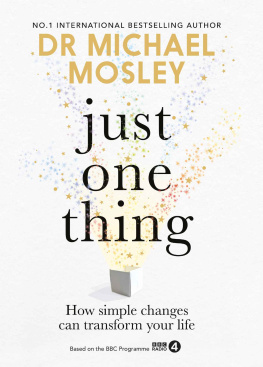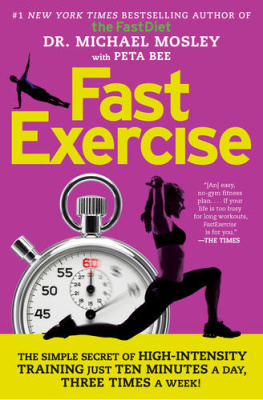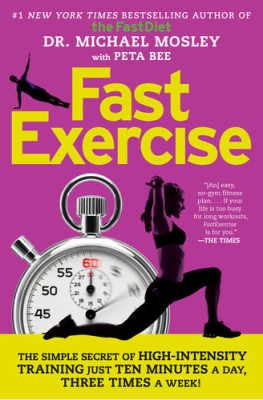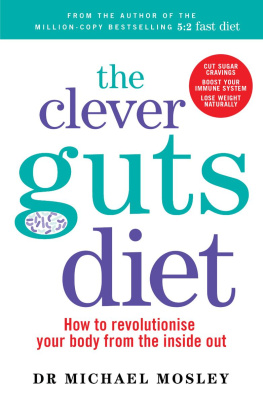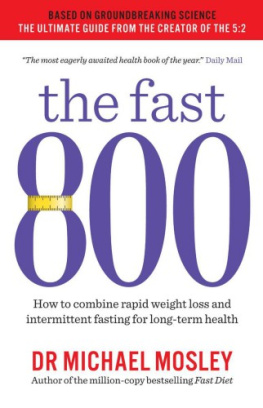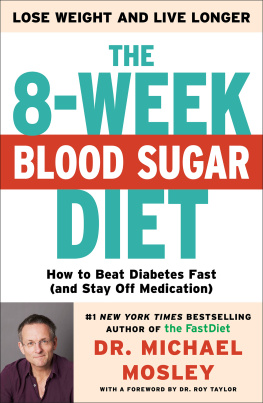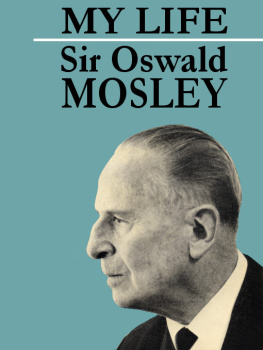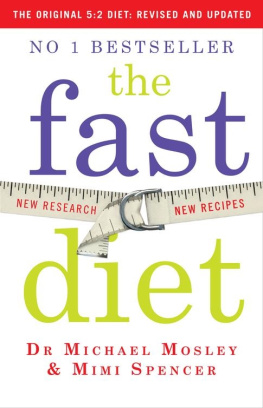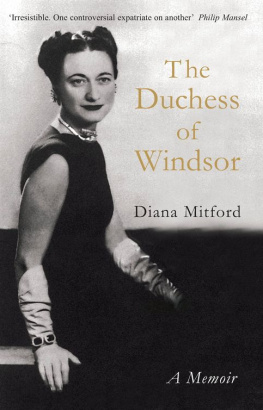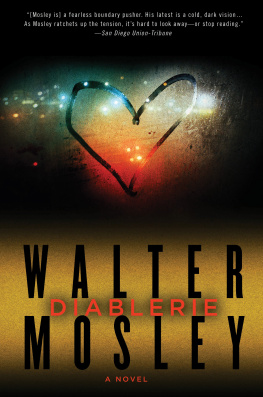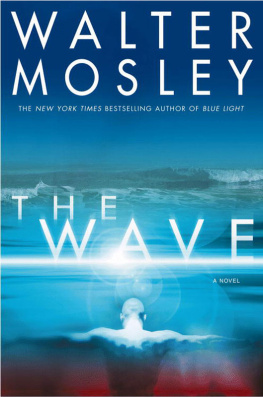Michael Mosley - Just One Thing
Here you can read online Michael Mosley - Just One Thing full text of the book (entire story) in english for free. Download pdf and epub, get meaning, cover and reviews about this ebook. year: 2022, publisher: Short Books, genre: Romance novel. Description of the work, (preface) as well as reviews are available. Best literature library LitArk.com created for fans of good reading and offers a wide selection of genres:
Romance novel
Science fiction
Adventure
Detective
Science
History
Home and family
Prose
Art
Politics
Computer
Non-fiction
Religion
Business
Children
Humor
Choose a favorite category and find really read worthwhile books. Enjoy immersion in the world of imagination, feel the emotions of the characters or learn something new for yourself, make an fascinating discovery.
- Book:Just One Thing
- Author:
- Publisher:Short Books
- Genre:
- Year:2022
- Rating:4 / 5
- Favourites:Add to favourites
- Your mark:
- 80
- 1
- 2
- 3
- 4
- 5
Just One Thing: summary, description and annotation
We offer to read an annotation, description, summary or preface (depends on what the author of the book "Just One Thing" wrote himself). If you haven't found the necessary information about the book — write in the comments, we will try to find it.
Just One Thing — read online for free the complete book (whole text) full work
Below is the text of the book, divided by pages. System saving the place of the last page read, allows you to conveniently read the book "Just One Thing" online for free, without having to search again every time where you left off. Put a bookmark, and you can go to the page where you finished reading at any time.
Font size:
Interval:
Bookmark:
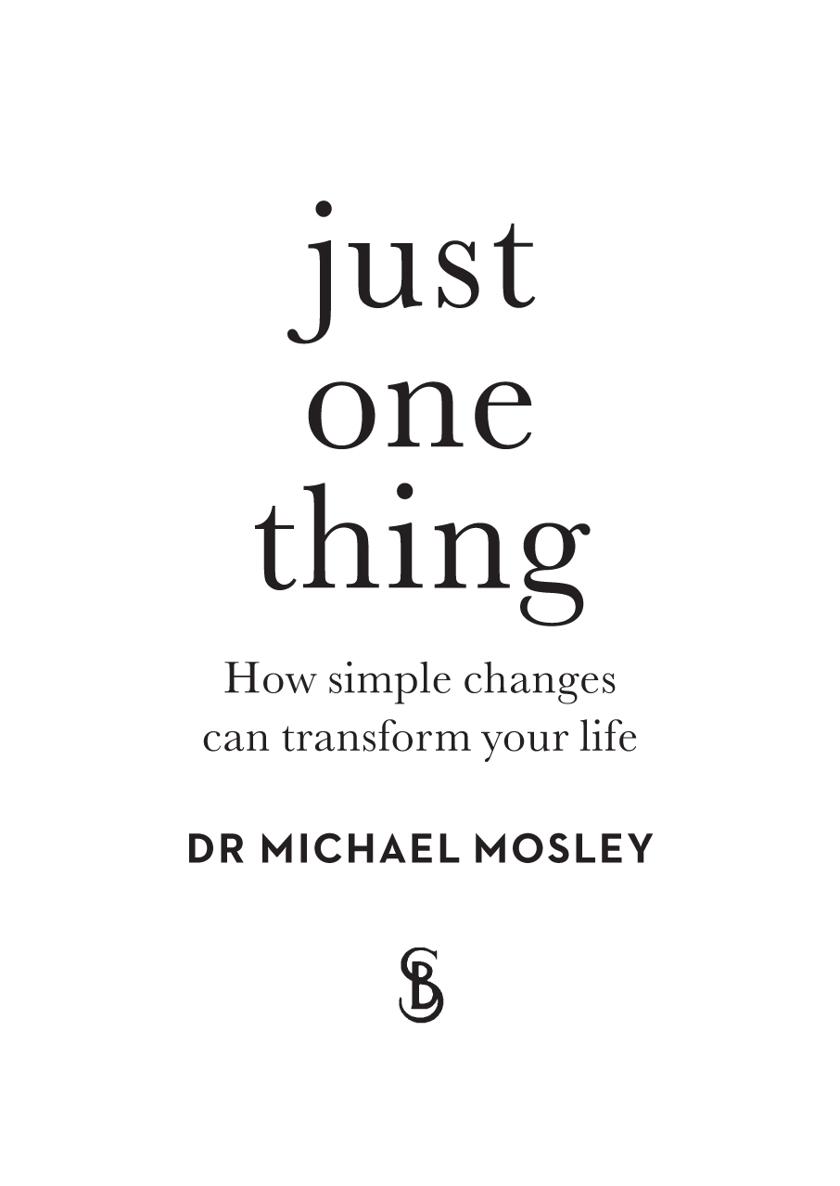
CONTENTS
HOW TO USE THIS EBOOK
Select one of the chapters from the and you will be taken straight to that chapter.
Look out for linked text (which is in blue) throughout the ebook that you can select to help you navigate between related sections.
You can double tap images to increase their size. To return to the original view, just tap the cross in the top left-hand corner of the screen.

INTRODUCTION
Although I originally trained as a doctor, I have spent most of my long and enjoyable career as a science journalist and TV presenter. This has enabled me to cover a lot of different subjects, but in recent years I have focused on exploring the science behind the many and varied health claims that I have come across. And, of course, trying things out on myself. Ive done some pretty crazy things in my time, including infecting myself with parasites, getting leeched, injecting my face with some of my own blood and swallowing a tiny camera so I could watch the workings of my gut. But it was in 2012, when I discovered that I had type 2 diabetes, that I got really serious about wanting to understand the drivers of mental and physical health.
Discovering I had type 2 diabetes led to me making a programme called Eat, Fast and Live Longer, during which I came across research showing the benefits of intermittent fasting. Over the course of eight weeks, I lost 9kg by doing a form of intermittent fasting which I called the 5:2 diet, and this enabled me to get my blood sugars back to normal, without medication. That, in turn, led me to write, with Mimi Spencer, The Fast Diet , which became an international bestseller, then to write more books (often with my wife Clare, who is a GP and bestselling recipe book writer), covering subjects ranging from weight loss and sleep, to exercise and ways to improve gut health.
Then, in 2021, during the Covid lockdown, I did something very different. I made my first ever podcast series. It was for BBC Sounds and Radio 4 and it was called Just One Thing. Setting up a recording studio in my home during lockdown was a challenge, but as I will show you, is really good for your brain, particularly an ageing brain like mine, and I loved doing it.
The idea of the podcast is simple: each 15-minute episode introduces Just One Thing you can do to improve your health. The series (which is ongoing) is full of quirky, fun and sometimes bizarre facts, and making it gives me the chance to interview eminent, and often very entertaining, scientists who are leaders in their field. In each episode we find a brave volunteer to give the thing a test run, and, of course, I also give it a go (if you listen to one of the early podcasts youll hear me yelping at my first blast of a cold . See for more on the science behind cold water immersion).
I was blessed with a very talented team, who made it happen and helped ensure it became a real hit. A big part of the appeal of Just One Thing is its simplicity, and I think that is also what makes it such a great way to turn good intentions into sustainable habits.
After all, most of us recognise the importance of keeping to a healthy weight, eating well, doing regular exercise, reducing stress and getting a good nights sleep. So what stops us? Well, firstly we are bombarded on a daily basis by a lot of vague and often conflicting advice in newspapers, TV and social media: drink coffee, dont drink coffee, cut down on fat, eat more fat, get out in the sun, cover up with sunscreen, exercise slowly or step up the pacewho to believe?
Then there is the problem of putting good advice into practice, of creating a new healthy habit and sticking to it. Many of us start off each New Year resolved to be healthier and more active, but within a month or so most of us have returned to our previous way of life. I dont think this is because we are inherently lazy or weak-willed it is because we havent created the environment where a new habit will stick. If you genuinely want to change then here are 10 rules, based on science, which I have found useful:
1. MAKE IT SIMPLE. The rationale behind Just One Thing is that you dont have to do a major overhaul of your life; these are things you can easily build into your routine. Small changes really can yield big benefits in terms of better mood, improved sleep, a sharper brain and reduced disease risk.
2. BE REALISTIC. Although I am going to try to excite you about all the benefits that come from doing lots of Just One Things, begin by doing what you think you can manage. Start small and build from there. That, after all, is the great advantage of this approach. You can always add in Just One More Thing later.
3. CREATE A TRIGGER. You are much more likely to do something if it is attached to an activity you are already doing. As you will see in the next chapter, I do my resistance exercises straight after I get out of bed because I know if I dont do them then I will never do them. I use getting out of bed (which I have to do every day) as a trigger for these exercises. You can use having a meal as a trigger to drink a large glass of water and that way you ensure that you drink enough water during the day (see because I know I will never go to regular yoga classes, but I do have to brush my teeth twice a day, so that seemed more realistic. You will come across lots more triggers as you go through the book.
4. KNOW WHY YOU ARE DOING IT. I strongly believe that if you really understand what the benefits are, and can remind yourself of them when the temptation to give up is strong, then you are much more likely to stick to something. Thats why this book contains lots of interviews with leading scientists, as well as references to scientific studies, which are easy to look up online. I want you to be convinced that these things are worth doing and persisting with. I also want you to tailor them to your own requirements.
5. STICK WITH IT FOR AT LEAST A MONTH. There is a widely held belief that you can introduce a new habit in 21 days. This is almost certainly untrue. A study published in the European Journal of Social Psychology concluded that it took anywhere between 18 and 254 days to ingrain a new habit, so stick with it!
6. TRY TO DISPLACE BAD HABITS WITH GOOD ONES. Many bad habits are deeply ingrained and may be almost impossible to shake. What you can do is try to displace them with better habits. This takes time and persistence.
7. TRY TO DO IT DAILY. Establishing a new habit is mainly about consistency and frequency. Although it is important to know why you are doing something, it is even more important to actually do it and do it on a regular basis. A lot of the things you will come across in this book can be done daily and even sometimes more than once a day. I have also tried to keep them short, as the shorter something is, the more likely you are to stick to it.
8. INVOLVE A FRIEND OR LOVED ONE. One of the main reasons why people pay for personal exercise trainers is that they feel they need someone around to make them do it its not that they dont know what to do. Doing a thing with a friend or loved one not only makes you more accountable; it can also make it more fun. Clare and I do a lot of things together, ranging from early-morning workouts to making ). We have a King Charles called Tari, who is over 10 years old, but who still gets incredibly excited every time she even thinks a walk is in the offing. Her joy is a powerful incentive for me to go.
9. BE KIND TO YOURSELF. If you have found a thing that you really like the look of, but just cant stick to it, then perhaps it is not right for you. Dont beat yourself up: accept that this may not be the moment in your life when it works for you. Take a look through the book and see what else appeals to you.
Next pageFont size:
Interval:
Bookmark:
Similar books «Just One Thing»
Look at similar books to Just One Thing. We have selected literature similar in name and meaning in the hope of providing readers with more options to find new, interesting, not yet read works.
Discussion, reviews of the book Just One Thing and just readers' own opinions. Leave your comments, write what you think about the work, its meaning or the main characters. Specify what exactly you liked and what you didn't like, and why you think so.

